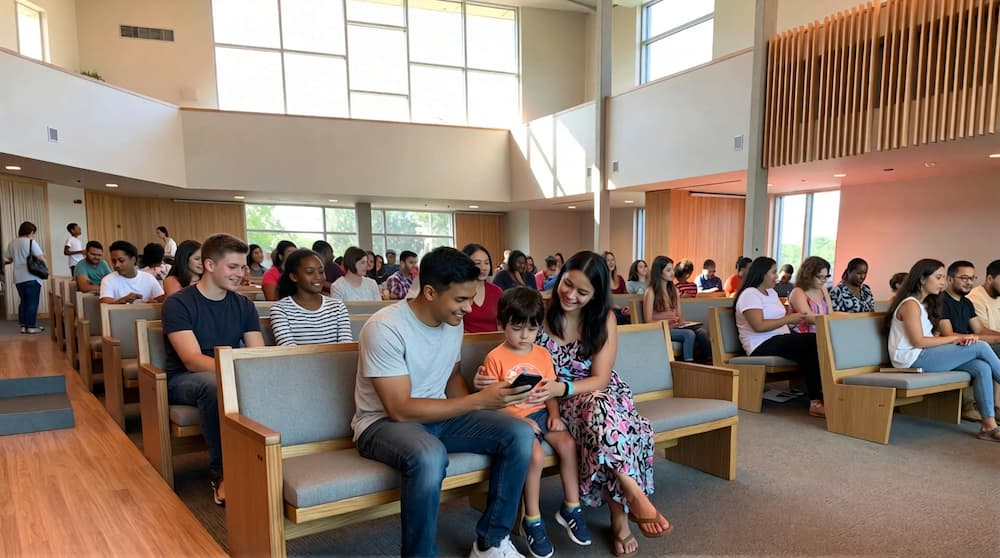Transforming Church Connectivity: 10 Biblical Principles for Effective SMS Communication
Transformations in communication culture, especially within a church, don't happen overnight, or spontaneously. To entirely embrace SMS or text communication, it helps to comprehend some essential principles first.
.jpeg)
Maybe, as a church, you've tried out various forms of digital communication. Perhaps your website is laden with email newsletters, social media connections, and so forth, but you've never fully taken advantage of an SMS–or text–communication platform.
That's fantastic. You are now on the precipice of an incredible opportunity to revolutionize the way you connect and engage with your congregation for years to come. This could mark the beginning of a fresh journey in drawing closer to God through effective communication as a local group of worshippers.
After decades in ministry, I've discovered that transformations in communication culture, especially within a church, don't happen overnight, or spontaneously. They are premeditated and are usually kick-started by the church leadership. To entirely embrace SMS or text communication, it helps to comprehend some essential principles first.
10 Strategies for Church SMS Communication
I’ve been in the church realm, and in the business realm.
In the business realm, the primary motivation is to make a profit. Whether you're managing a company that creates software, hardware, or groundbreaking telecommunications technology, the ultimate goal is profitability.
This doesn't hold true for a church. Churches are nonprofits, leading some leaders to push communication concerns aside.
But let's not forget the instructions Jesus left His disciples.
He said, "Therefore go and make disciples of all nations, baptizing them in the name of the Father and of the Son and of the Holy Spirit" (Matthew 28:19).
The assignment we've been given is an enormous one. We are to go into all the world, and that requires resources, including effective communication tools. If we are sincere about our part in fulfilling the Great Commission, it'll take a robust communication strategy to reach there…the kind of strategy used by businesses.
That being said, here are 10 best practices for effective SMS communications for churches.
1. Understand the Biblical Foundations for Communication.
Churches are not motivated by profit but are guided by the teachings of Jesus. It's important to remember the instructions he left us: "Therefore go and make disciples of all nations, baptizing them in the name of the Father and of the Son and of the Holy Spirit" (Matthew 28:19). This mission requires effective communication tools.
2. Commit to Growth and Connection.
Not every church needs to adopt every communication method, but every church should seek to grow and connect with more people. Aim to make a significant impact on your community and the world, and consider SMS communication as a tool to achieve this.
3. Appreciate the Importance of Effective Communication.
It's not just about the message delivered, it's about our hearts. Christians should agree that God wants His people to reach out effectively. Understanding this can transform the way we perceive and use SMS communication.
4. Embrace Stewardship.
Recognize that everything we possess, are, and do belongs to God. The tools we have for communication are granted to us by Him and should be used judiciously to further His teachings.
5. Continually Teach and Reinforce Communication Principles.
Once your leadership understands the biblical principles for effective communication, it's essential to impart these to the congregation. This should be done not just once or during a single sermon series, but in a sustainable and continuous way. This will foster improved connectivity within your church community.
6. First things first, Ask Permission.
Okay, so privacy is huge, right? It's the bedrock of any good communication, and that's especially true when we're talking about SMS at church. So before you start firing off texts to your congregation, make sure you've got a green light from everyone. A simple sign-up form at services or an online one on your website should do the trick.
Doing this not only shows you respect people's privacy, but it also means your SMS blasts are more likely to be welcomed, sparking some real engagement. Plus, it keeps you on the right side of telecommunication laws that need explicit consent before sending commercial texts.
7. Watch the Clock.
Texts are great because they get your message out there instantly, but don't forget to be mindful about when you're sending these things. Try to stick to normal waking hours when people are likely to see and respond.
8. Get Personal
Personalization is your secret weapon when it comes to effective texting. You might not be able to craft unique messages for everyone, but something as simple as using their name can make a world of difference.
These personalized texts make folks feel seen and appreciated, which helps to tighten that bond with the church. Try segmenting your congregation by age, interests, or church activities to really tailor your messages.
9. Keep It Short and Sweet
Remember, you've only got 160 characters to play with, so make them count. Keep your messages clear, concise, and straight to the point.
Skip the complex language and jargon. If you're sharing event info, just stick to the basics - what, where, and when. Got something more complex to say? Think about including a link to a webpage where folks can get the lowdown.
10. Save It for the Important Stuff
With texts being so direct and personal, it's best to save them for the big stuff - updates, reminders, and personal communication. Regularly sending out irrelevant texts can get old fast, and you don't want your church members ignoring your messages, or even worse, opting out altogether.
So be smart with your texting, making sure each message serves a purpose and adds some kind of value for the recipient. This could be a heads-up about an upcoming service, a meaningful scripture verse, or a shout-out for a member's contribution or achievement.
Conclusion
SMS–or texting–is less about the technology itself and more about the communication principles applied. It's about respecting privacy, acknowledging the convenience of recipients, personalizing communication, being clear and concise, and ensuring each message adds value.
The power of SMS, or texting, lies in its simplicity and universality. As churches adapt to the digital age, the art of effective SMS communication will be an increasingly valuable skill. It's not about reverting to an older technology; it's about leveraging the most efficient communication mediums to connect, engage, and build a vibrant church community.
This isn’t a step back to old technology, but a purposeful stride forward. As the digital landscape continues to evolve, the effectiveness and relevance of SMS communication remain constant - a testament to the timeless principle that sometimes, simplicity is revolutionary!
Sign Up for Product Updates
Maybe, as a church, you've tried out various forms of digital communication. Perhaps your website is laden with email newsletters, social media connections, and so forth, but you've never fully taken advantage of an SMS–or text–communication platform.
That's fantastic. You are now on the precipice of an incredible opportunity to revolutionize the way you connect and engage with your congregation for years to come. This could mark the beginning of a fresh journey in drawing closer to God through effective communication as a local group of worshippers.
After decades in ministry, I've discovered that transformations in communication culture, especially within a church, don't happen overnight, or spontaneously. They are premeditated and are usually kick-started by the church leadership. To entirely embrace SMS or text communication, it helps to comprehend some essential principles first.
10 Strategies for Church SMS Communication
I’ve been in the church realm, and in the business realm.
In the business realm, the primary motivation is to make a profit. Whether you're managing a company that creates software, hardware, or groundbreaking telecommunications technology, the ultimate goal is profitability.
This doesn't hold true for a church. Churches are nonprofits, leading some leaders to push communication concerns aside.
But let's not forget the instructions Jesus left His disciples.
He said, "Therefore go and make disciples of all nations, baptizing them in the name of the Father and of the Son and of the Holy Spirit" (Matthew 28:19).
The assignment we've been given is an enormous one. We are to go into all the world, and that requires resources, including effective communication tools. If we are sincere about our part in fulfilling the Great Commission, it'll take a robust communication strategy to reach there…the kind of strategy used by businesses.
That being said, here are 10 best practices for effective SMS communications for churches.
1. Understand the Biblical Foundations for Communication.
Churches are not motivated by profit but are guided by the teachings of Jesus. It's important to remember the instructions he left us: "Therefore go and make disciples of all nations, baptizing them in the name of the Father and of the Son and of the Holy Spirit" (Matthew 28:19). This mission requires effective communication tools.
2. Commit to Growth and Connection.
Not every church needs to adopt every communication method, but every church should seek to grow and connect with more people. Aim to make a significant impact on your community and the world, and consider SMS communication as a tool to achieve this.
3. Appreciate the Importance of Effective Communication.
It's not just about the message delivered, it's about our hearts. Christians should agree that God wants His people to reach out effectively. Understanding this can transform the way we perceive and use SMS communication.
4. Embrace Stewardship.
Recognize that everything we possess, are, and do belongs to God. The tools we have for communication are granted to us by Him and should be used judiciously to further His teachings.
5. Continually Teach and Reinforce Communication Principles.
Once your leadership understands the biblical principles for effective communication, it's essential to impart these to the congregation. This should be done not just once or during a single sermon series, but in a sustainable and continuous way. This will foster improved connectivity within your church community.
6. First things first, Ask Permission.
Okay, so privacy is huge, right? It's the bedrock of any good communication, and that's especially true when we're talking about SMS at church. So before you start firing off texts to your congregation, make sure you've got a green light from everyone. A simple sign-up form at services or an online one on your website should do the trick.
Doing this not only shows you respect people's privacy, but it also means your SMS blasts are more likely to be welcomed, sparking some real engagement. Plus, it keeps you on the right side of telecommunication laws that need explicit consent before sending commercial texts.
7. Watch the Clock.
Texts are great because they get your message out there instantly, but don't forget to be mindful about when you're sending these things. Try to stick to normal waking hours when people are likely to see and respond.
8. Get Personal
Personalization is your secret weapon when it comes to effective texting. You might not be able to craft unique messages for everyone, but something as simple as using their name can make a world of difference.
These personalized texts make folks feel seen and appreciated, which helps to tighten that bond with the church. Try segmenting your congregation by age, interests, or church activities to really tailor your messages.
9. Keep It Short and Sweet
Remember, you've only got 160 characters to play with, so make them count. Keep your messages clear, concise, and straight to the point.
Skip the complex language and jargon. If you're sharing event info, just stick to the basics - what, where, and when. Got something more complex to say? Think about including a link to a webpage where folks can get the lowdown.
10. Save It for the Important Stuff
With texts being so direct and personal, it's best to save them for the big stuff - updates, reminders, and personal communication. Regularly sending out irrelevant texts can get old fast, and you don't want your church members ignoring your messages, or even worse, opting out altogether.
So be smart with your texting, making sure each message serves a purpose and adds some kind of value for the recipient. This could be a heads-up about an upcoming service, a meaningful scripture verse, or a shout-out for a member's contribution or achievement.
Conclusion
SMS–or texting–is less about the technology itself and more about the communication principles applied. It's about respecting privacy, acknowledging the convenience of recipients, personalizing communication, being clear and concise, and ensuring each message adds value.
The power of SMS, or texting, lies in its simplicity and universality. As churches adapt to the digital age, the art of effective SMS communication will be an increasingly valuable skill. It's not about reverting to an older technology; it's about leveraging the most efficient communication mediums to connect, engage, and build a vibrant church community.
This isn’t a step back to old technology, but a purposeful stride forward. As the digital landscape continues to evolve, the effectiveness and relevance of SMS communication remain constant - a testament to the timeless principle that sometimes, simplicity is revolutionary!
podcast transcript
Maybe, as a church, you've tried out various forms of digital communication. Perhaps your website is laden with email newsletters, social media connections, and so forth, but you've never fully taken advantage of an SMS–or text–communication platform.
That's fantastic. You are now on the precipice of an incredible opportunity to revolutionize the way you connect and engage with your congregation for years to come. This could mark the beginning of a fresh journey in drawing closer to God through effective communication as a local group of worshippers.
After decades in ministry, I've discovered that transformations in communication culture, especially within a church, don't happen overnight, or spontaneously. They are premeditated and are usually kick-started by the church leadership. To entirely embrace SMS or text communication, it helps to comprehend some essential principles first.
10 Strategies for Church SMS Communication
I’ve been in the church realm, and in the business realm.
In the business realm, the primary motivation is to make a profit. Whether you're managing a company that creates software, hardware, or groundbreaking telecommunications technology, the ultimate goal is profitability.
This doesn't hold true for a church. Churches are nonprofits, leading some leaders to push communication concerns aside.
But let's not forget the instructions Jesus left His disciples.
He said, "Therefore go and make disciples of all nations, baptizing them in the name of the Father and of the Son and of the Holy Spirit" (Matthew 28:19).
The assignment we've been given is an enormous one. We are to go into all the world, and that requires resources, including effective communication tools. If we are sincere about our part in fulfilling the Great Commission, it'll take a robust communication strategy to reach there…the kind of strategy used by businesses.
That being said, here are 10 best practices for effective SMS communications for churches.
1. Understand the Biblical Foundations for Communication.
Churches are not motivated by profit but are guided by the teachings of Jesus. It's important to remember the instructions he left us: "Therefore go and make disciples of all nations, baptizing them in the name of the Father and of the Son and of the Holy Spirit" (Matthew 28:19). This mission requires effective communication tools.
2. Commit to Growth and Connection.
Not every church needs to adopt every communication method, but every church should seek to grow and connect with more people. Aim to make a significant impact on your community and the world, and consider SMS communication as a tool to achieve this.
3. Appreciate the Importance of Effective Communication.
It's not just about the message delivered, it's about our hearts. Christians should agree that God wants His people to reach out effectively. Understanding this can transform the way we perceive and use SMS communication.
4. Embrace Stewardship.
Recognize that everything we possess, are, and do belongs to God. The tools we have for communication are granted to us by Him and should be used judiciously to further His teachings.
5. Continually Teach and Reinforce Communication Principles.
Once your leadership understands the biblical principles for effective communication, it's essential to impart these to the congregation. This should be done not just once or during a single sermon series, but in a sustainable and continuous way. This will foster improved connectivity within your church community.
6. First things first, Ask Permission.
Okay, so privacy is huge, right? It's the bedrock of any good communication, and that's especially true when we're talking about SMS at church. So before you start firing off texts to your congregation, make sure you've got a green light from everyone. A simple sign-up form at services or an online one on your website should do the trick.
Doing this not only shows you respect people's privacy, but it also means your SMS blasts are more likely to be welcomed, sparking some real engagement. Plus, it keeps you on the right side of telecommunication laws that need explicit consent before sending commercial texts.
7. Watch the Clock.
Texts are great because they get your message out there instantly, but don't forget to be mindful about when you're sending these things. Try to stick to normal waking hours when people are likely to see and respond.
8. Get Personal
Personalization is your secret weapon when it comes to effective texting. You might not be able to craft unique messages for everyone, but something as simple as using their name can make a world of difference.
These personalized texts make folks feel seen and appreciated, which helps to tighten that bond with the church. Try segmenting your congregation by age, interests, or church activities to really tailor your messages.
9. Keep It Short and Sweet
Remember, you've only got 160 characters to play with, so make them count. Keep your messages clear, concise, and straight to the point.
Skip the complex language and jargon. If you're sharing event info, just stick to the basics - what, where, and when. Got something more complex to say? Think about including a link to a webpage where folks can get the lowdown.
10. Save It for the Important Stuff
With texts being so direct and personal, it's best to save them for the big stuff - updates, reminders, and personal communication. Regularly sending out irrelevant texts can get old fast, and you don't want your church members ignoring your messages, or even worse, opting out altogether.
So be smart with your texting, making sure each message serves a purpose and adds some kind of value for the recipient. This could be a heads-up about an upcoming service, a meaningful scripture verse, or a shout-out for a member's contribution or achievement.
Conclusion
SMS–or texting–is less about the technology itself and more about the communication principles applied. It's about respecting privacy, acknowledging the convenience of recipients, personalizing communication, being clear and concise, and ensuring each message adds value.
The power of SMS, or texting, lies in its simplicity and universality. As churches adapt to the digital age, the art of effective SMS communication will be an increasingly valuable skill. It's not about reverting to an older technology; it's about leveraging the most efficient communication mediums to connect, engage, and build a vibrant church community.
This isn’t a step back to old technology, but a purposeful stride forward. As the digital landscape continues to evolve, the effectiveness and relevance of SMS communication remain constant - a testament to the timeless principle that sometimes, simplicity is revolutionary!
VIDEO transcript
Maybe, as a church, you've tried out various forms of digital communication. Perhaps your website is laden with email newsletters, social media connections, and so forth, but you've never fully taken advantage of an SMS–or text–communication platform.
That's fantastic. You are now on the precipice of an incredible opportunity to revolutionize the way you connect and engage with your congregation for years to come. This could mark the beginning of a fresh journey in drawing closer to God through effective communication as a local group of worshippers.
After decades in ministry, I've discovered that transformations in communication culture, especially within a church, don't happen overnight, or spontaneously. They are premeditated and are usually kick-started by the church leadership. To entirely embrace SMS or text communication, it helps to comprehend some essential principles first.
10 Strategies for Church SMS Communication
I’ve been in the church realm, and in the business realm.
In the business realm, the primary motivation is to make a profit. Whether you're managing a company that creates software, hardware, or groundbreaking telecommunications technology, the ultimate goal is profitability.
This doesn't hold true for a church. Churches are nonprofits, leading some leaders to push communication concerns aside.
But let's not forget the instructions Jesus left His disciples.
He said, "Therefore go and make disciples of all nations, baptizing them in the name of the Father and of the Son and of the Holy Spirit" (Matthew 28:19).
The assignment we've been given is an enormous one. We are to go into all the world, and that requires resources, including effective communication tools. If we are sincere about our part in fulfilling the Great Commission, it'll take a robust communication strategy to reach there…the kind of strategy used by businesses.
That being said, here are 10 best practices for effective SMS communications for churches.
1. Understand the Biblical Foundations for Communication.
Churches are not motivated by profit but are guided by the teachings of Jesus. It's important to remember the instructions he left us: "Therefore go and make disciples of all nations, baptizing them in the name of the Father and of the Son and of the Holy Spirit" (Matthew 28:19). This mission requires effective communication tools.
2. Commit to Growth and Connection.
Not every church needs to adopt every communication method, but every church should seek to grow and connect with more people. Aim to make a significant impact on your community and the world, and consider SMS communication as a tool to achieve this.
3. Appreciate the Importance of Effective Communication.
It's not just about the message delivered, it's about our hearts. Christians should agree that God wants His people to reach out effectively. Understanding this can transform the way we perceive and use SMS communication.
4. Embrace Stewardship.
Recognize that everything we possess, are, and do belongs to God. The tools we have for communication are granted to us by Him and should be used judiciously to further His teachings.
5. Continually Teach and Reinforce Communication Principles.
Once your leadership understands the biblical principles for effective communication, it's essential to impart these to the congregation. This should be done not just once or during a single sermon series, but in a sustainable and continuous way. This will foster improved connectivity within your church community.
6. First things first, Ask Permission.
Okay, so privacy is huge, right? It's the bedrock of any good communication, and that's especially true when we're talking about SMS at church. So before you start firing off texts to your congregation, make sure you've got a green light from everyone. A simple sign-up form at services or an online one on your website should do the trick.
Doing this not only shows you respect people's privacy, but it also means your SMS blasts are more likely to be welcomed, sparking some real engagement. Plus, it keeps you on the right side of telecommunication laws that need explicit consent before sending commercial texts.
7. Watch the Clock.
Texts are great because they get your message out there instantly, but don't forget to be mindful about when you're sending these things. Try to stick to normal waking hours when people are likely to see and respond.
8. Get Personal
Personalization is your secret weapon when it comes to effective texting. You might not be able to craft unique messages for everyone, but something as simple as using their name can make a world of difference.
These personalized texts make folks feel seen and appreciated, which helps to tighten that bond with the church. Try segmenting your congregation by age, interests, or church activities to really tailor your messages.
9. Keep It Short and Sweet
Remember, you've only got 160 characters to play with, so make them count. Keep your messages clear, concise, and straight to the point.
Skip the complex language and jargon. If you're sharing event info, just stick to the basics - what, where, and when. Got something more complex to say? Think about including a link to a webpage where folks can get the lowdown.
10. Save It for the Important Stuff
With texts being so direct and personal, it's best to save them for the big stuff - updates, reminders, and personal communication. Regularly sending out irrelevant texts can get old fast, and you don't want your church members ignoring your messages, or even worse, opting out altogether.
So be smart with your texting, making sure each message serves a purpose and adds some kind of value for the recipient. This could be a heads-up about an upcoming service, a meaningful scripture verse, or a shout-out for a member's contribution or achievement.
Conclusion
SMS–or texting–is less about the technology itself and more about the communication principles applied. It's about respecting privacy, acknowledging the convenience of recipients, personalizing communication, being clear and concise, and ensuring each message adds value.
The power of SMS, or texting, lies in its simplicity and universality. As churches adapt to the digital age, the art of effective SMS communication will be an increasingly valuable skill. It's not about reverting to an older technology; it's about leveraging the most efficient communication mediums to connect, engage, and build a vibrant church community.
This isn’t a step back to old technology, but a purposeful stride forward. As the digital landscape continues to evolve, the effectiveness and relevance of SMS communication remain constant - a testament to the timeless principle that sometimes, simplicity is revolutionary!




























